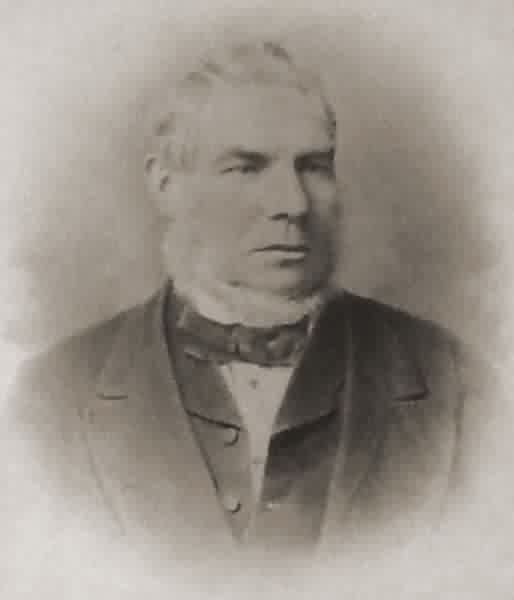yeovil people
edward raymond
Glove Manufacturer and Mayor of Yeovil
 Edward
Raymond was born
in 1811 in
Sparkford, the
son of gardener Edward
Raymond
(1780-1856) and
Martha née Feaver (b1779).
He was the older
brother of glove
manufacturers
Cuthbert Raymond
and
William Raymond.
Edward
Raymond was born
in 1811 in
Sparkford, the
son of gardener Edward
Raymond
(1780-1856) and
Martha née Feaver (b1779).
He was the older
brother of glove
manufacturers
Cuthbert Raymond
and
William Raymond.
By the time of the 1851 census Edward Snr and Martha, both born in Queen Camel, were living in Vicarage Street with their married dressmaker daughter Sarah Hallett and her three children.
In the 1841 census, Edward Raymond Jnr was listed as a glove manufacturer living in Townsend although in fact this is what we would now call Lower Middle Street and was roughly on the corner with Station Road, opposite the William Dampier. He was listed with his wife Jane and one-year-old daughter Mary. Jane died in the spring of 1850 and in the census of 1851 Edward was listed living at 1 South Street with his two daughters Mary aged 10 and Lucy aged eight. Their house was on the corner of South Street and Stars Lane, and shown on the 1886 Ordnance Survey as Mars House - see map below. There was also a live-in housekeeper. When Edward described his occupation for the census he interestingly included the occupations of his employees which gives a good idea of the make-up of trades in a medium-sized Victorian glove manufactory. The full listing is as follows "Glove Manufacturer employing 5 leather dressers, 1 dyer, 7 leather parers, 14 glove cutters, 4 apprentices, 6 boys, 200 women as makers and finishes of gloves." Edward Raymond was listed as a glove manufacturer of Stars Lane in both the 1866 and 1875 editions of the Post Office Directory.
In his career in local politics and town government, Edward was a member of the Yeovil Vestry during the 1830s. Following the Yeovil Reform Riot of October 1831, Edward joined the newly-formed Yeovil Political Union and was soon elected to serve on the Management Committee.

Courtesy of South Somerset Heritage Collection
A handbill dated 20 June 1832 and signed by the committee of the Yeovil Political Union, including 21-year-old Edward Raymond who was a member of the Committee.
The 29 March 1845 edition of the Sherborne Mercury reported on a meeting of the Vestry, in which it was noted "... it was expedient that Mr John Alexander, Mr Edward Raymond, Mr John Brook Junr. and Mr George Wellington (the present Overseers), should be reappointed to perform the duties of the office of Overseers for the year ensuing."
In 1851, Edward was noted as an investor in the South Western Railway Company.
Although he had never been a Burgess, Portreeve or Town Commissioner, he was one of the twelve people elected to the new Yeovil Borough Council when it was first formed in 1854. Edward Raymond was elected to the office of mayor and served two terms, the first being from 1864 to 1867 and the second being 1879 to 1880. In 1879 he was appointed as a Borough Magistrate.
By the time of the 1861 census Edward and his two daughters were still living in Mars House. Edward's workforce would have appeared to have slimmed down by this time since he listed his occupation as "Leather Glover Master, employing 18 men and 7 boys". In the autumn of 1863 Edward's daughter Lucy married Benjamin Chaffey in Yeovil so in the 1871 census Edward was living with just his daughter Mary and a servant although according to the census enumerator (who must have had a sense of humour) they were living in Ebenezer Row - a distinctly lower social standing than Mars House. 60-year-old Edward gave his occupation simply as glove manufacturer. Behind Mars House were what were described in 1869 as "newly erected wool stores" which were in the occupation of Raymond's son-in-law, Benjamin Chaffey. The lower right quadrant of the map below is an orchard that was also owned by Edward Raymond.
Edward was head of the Bench at the committal hearing of the Colmer Murder Case, held at the Town Hall in April 1880.
Edward Raymond died on 23 November 1880 at Yeovil and administration of his estate was granted to Lucy Chaffey, his daughter. His personal estate was valued at 'under £2,000' (somewhere just under £875,000 at today's value).

Edward Raymond's signature against the Vestry minutes of 8 September 1836.
map

The 1886 Ordnance Survey showing Mars House and its large garden at top left on the corner of Stars Lane and South Street. Behind Mars House, at the end of Raymond's orchard, were what were described in 1869 as "newly erected wool stores" which were in the occupation of Raymond's son-in-law, Benjamin Chaffey. The large empty space at the centre of this map was an orchard that was also owned by Edward Raymond and the wool store, at bottom right, was built in a sectioned-off part of the orchard. The wool store was later used as the premises of scrap merchant and Mayor of Yeovil, Ernest Farr.
Gallery

Edward Raymond
(1811-1880)